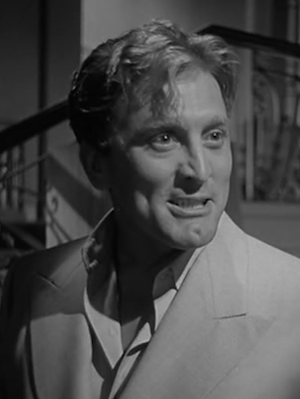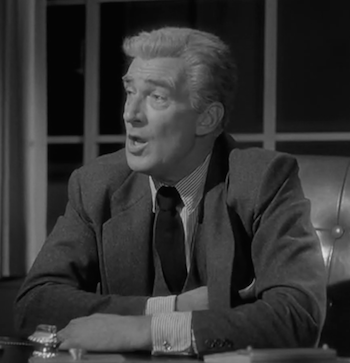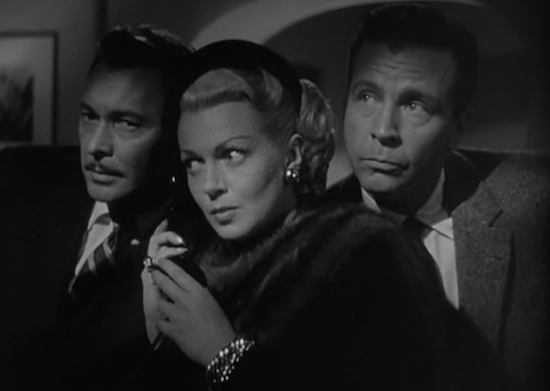
The Bad and the Beautiful (1952) presents that classic question: what are you willing to put up with, to be under the direction of a genius? Whiplash (2014) did the same just a couple years ago, conductor Fletcher (J.K. Simmons) compelling his protégé drummer to dangerous extremes for his art. The question has obviously lost none of its potency in the last 60 years. But this classic Hollywood version begins with the victims of brilliant producer Jonathan Shields’ (Kirk Douglas’). You see the damage first, and it colors how you view the rest of the film.
And yet….It’s the start of the film, and while you’re soon treated to flashbacks of what treatment led Shields to get such cold shoulders from former pals, you can’t help wondering how they’ll answer the question—and how you would too.
Shields, it appears, is destitute in Paris. But he has an idea for a film, and three victims of his ruthless ambition would be perfect for it: Georgia (Lana Turner), the actress he romanced to improve her performance, then dumped; Fred Amiel (Barry Sullivan), the director/best friend whose work he stole; and screenwriter James Lee Bartlow (Dick Powell), whose life he destroyed. Shields sends proxy Harry Pebbel (Walter Pidgeon) to lure them. And Pebbel, who has forgiven Shields for his own wrongs, gathers them together, hoping they’ll stick around long enough for Shields’ call about the film. And so the flashbacks of each betrayal begin, ranging from egregious to abominable.
Douglas is predictably mesmerizing in the role, which was supposedly loosely based on producer and studio exec David O. Selznick, best known now for Gone with the Wind. In fact, Douglas is so good in such roles that I found myself actually expecting worse behavior from Shields, bad as it was (Ace in the Hole being the last film of his I viewed).
What I found fascinating about the film this time around is the horrifying cruelty of Pebbel.

He actually pooh-poohs the three victims over their healthy desire to avoid the psychological damage Shields excels at inflicting, as if their heartbreaks are merely scraped knees. Pebbel’s argument—that human losses are inconsequential in comparison to accolades—is terrifying, and his calmness in expressing these views chilling. Shields may have a monstrous side, but he’s nothing compared to his Machiavellian helper.
But it is a question, whether for some the pursuit of greatness is worth human costs (though it would be hard to argue James’ was). Certainly, many artists we celebrate today have said yes to such a question. Many do now. The kindhearted instincts within you may urge such artists, “Leave!! Leave!” But the part of you who cherishes excellence secretly whispers, “Stay….”
The call from Shields comes, of course. And of course, they all refuse to remain. But then Georgia picks up the phone connection in another room, and the others lean in to hear, and we see them listening, lured back.

Will they, won’t they?
This post is part of the Hollywood on Hollywood fall blogathon hosted by the Classic Movie Blog Association. Check out the wonderful entries here.

Great take on the film as you ponder its central message. Especially now with controversies surrounding Birth of a Nations or the latest Polanski or Allen movies, the question is whether the artist’s personal nastiness are worth ignoring in the quest for artistic fulfillment. Personally, I think the audience has to abide by its own conscience as much as the artists do, but that always involves imperfect information. It’s a tricky tightrope walk. Excellent post!
Thanks, Danny! I am fascinated by that question as well–how much we’re implicated as consumers if we pay to see a film by someone we deplore. It’s true that we have less inside info than the artists usually, but with Polanski, of course, we do have enough knowledge…
I loved the point you made regarding reward being worth more than life itself– a creepy concept that seems to be real popular in these inside Hollywood flicks! I’ve also read that Shields reflected the personas of Orson Welles and Val Lewton in addition to O’Selznick.
Thank you! I can see that. And it’s interesting how often these brilliant (but horrifying) geniuses are portrayed as magnetic personalities, making it tougher to stay away.
As a John Ford fan, “The Bad and the Beautiful” puts me in mind of that director’s relationship with actors. There are horror stories of how he treated some of the members of his stock company, but there it is – it was a stock company. No matter how nasty things may have gotten at times, certain actors remained loyal. Did they overlook the behavior for the love of the finished work? However it was reconciled, it is part of the collaborative process.
I have heard some negative stories of his treatment of actors, though not (I suspect) the worst of them. Look at all the defenders of Polanski, of Woody Allen. It’s true now too, isn’t it?
I completely agree with your analysis of Pebbel. He is, after all, a studio bigwig whose heart rests on the bottom line. Yes, Shields did advance each person’s Hollywood career, but he also destroyed something valuable in each of them. Like you said, it’s rather cruel of Pebbel to compare the damage Shields did to a scraped knee.
Great review!
Thanks! Yes, it’s true. It’s just seldom someone is so upfront (even in film) about such priorities!
Some of the disgusting creatures we so love to hate. I must revisit this one soon. Terrific analysis!
Aurora
Thank you! Yes, it’s true. It’s fun to rewatch!